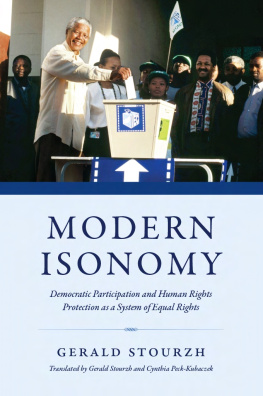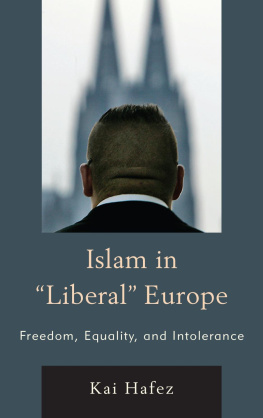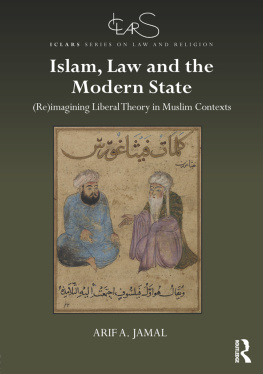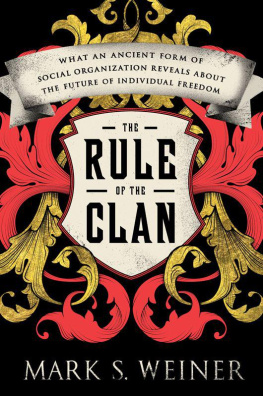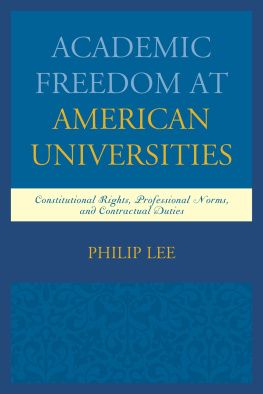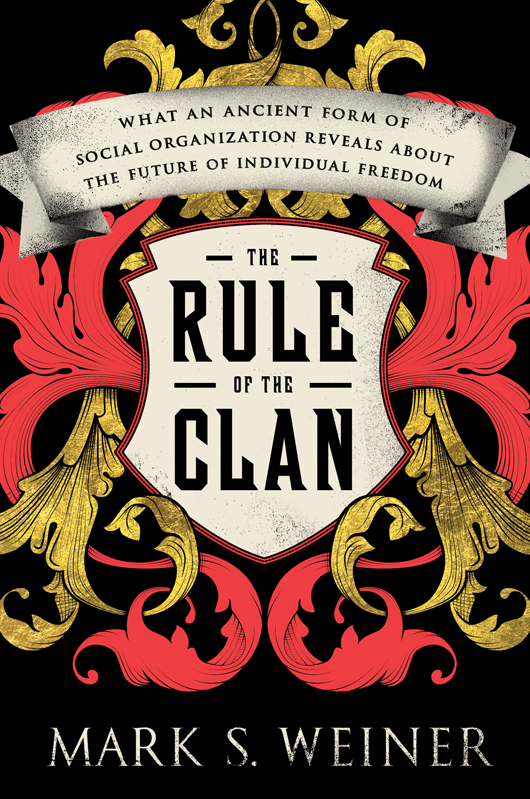
The author and publisher have provided this e-book to you for your personal use only. You may not make this e-book publicly available in any way. Copyright infringement is against the law. If you believe the copy of this e-book you are reading infringes on the authors copyright, please notify the publisher at: us.macmillanusa.com/piracy.
For Stephanie
for every moment
The savage mind is the mind of mankind.
Robin Fox
CONTENTS
PART ONE
THE CHALLENGE OF THE CLAN
ONE
INDIVIDUALISMS PARADOX
Imagine that one fine morning you are strolling down the sidewalk on your way to work. Suddenly, a young jogger wearing headphones turns the corner, running swiftly, oblivious to the world around him. He crashes into you and as you hit the ground you feel a sharp pain in your arm, which quickly begins to swell. Its broken. Soon after visiting your doctor, you contact your lawyer. He begins a civil suit against the jogger so that you can be compensated for your injury.
The case is open and shut. The jogger was clearly at fault and he will be held accountable for the harm he caused.
Next, imagine that you decide to open a small business, perhaps a bakery specializing in German-style breads. You rent the perfect building for the shop and visit your local bank for a loan. The loan officer reviews your excellent business plan and approves it. You sign your name to a stack of papers he slides across his desk and soon you have the capital you need to purchase ovens and other equipment. You are now responsible for repaying the loan.
Nobody could seriously question your liability or the banks right to be repaid.
In both these cases, the laws basic focus, what social scientists call its framework of analysis or its jural unit, is the individual rather than the family. In the case of the errant jogger, when your lawyer contacts the joggers lawyer, he will make a claim against the jogger and not against the joggers brother or sister, who are irrelevant to the suit. Likewise, your own brother or sister will have no claim to any settlement money you might receive.
In the case of your business venture, too, much as you might wish to do so, you cant foist your financial obligations onto others without their consent. By taking out a loan, you dont make your family members responsible for the success or failure of your bakery. At the same time, you neednt obtain their permission to take out a loan in the first place. The law makes you responsible for meeting your financial obligations and it also enables you to contract for them yourself, with your own signature.
This individualist focus is fundamental to the law of modern liberal societies. It lies at the core of nations that trace their democratic political heritage to the Enlightenment and their economic roots to the Industrial Revolutionand that hold individual self-fulfillment and personal development as a central moral value. Indeed, legal individualism is so basic to the social fabric of liberal societies that most of us who live in them take it as a matter of course.
In an election, you cast your vote for yourself alone, rather than for your household, village, or tribe. Doing so would seem absurdit would contravene the axiomatic principle of one person, one vote. Nor does the head of your household, village, or tribe vote on your behalf.
When you enter into a marriage, you alone incur its benefits and obligations. A wedding may bind two families together in a metaphorical sense. But it doesnt establish a relationship between them as a matter of law, for instance by requiring them to come to each others mutual aid or military defense.
If one evening you are watching a movie and a notorious thief, John Quick Hands Smith, steals your car, police will seek to capture and arrest John Smith. If instead the officers arrest his staid brother Jack, an accountant, explaining to a judge that after all Jack is related to John, the officers will be disciplined. Likewise, when you call the police station to report the incident, you will be asked for your street address rather than the name of your grandparentsyour lineage is irrelevant to whether the state will protect you from crime.
Such individualism extends as well to the legal issues of property and inheritance. In liberal societies, land need not be owned in common by tribal groups or village associations, as it is in many parts of the world, with individuals having only a temporary and limited claim to its use, known as a usufruct interest. Instead, land can be held by individuals, who have a general right to do with it as they wish, including the right to exclude others from its benefits.
Similarly, in common law jurisdictions, people are free to will their estates to whomever they please (civil law jurisdictions impose some limits on this principle). Assuming they comply with technical rules for creating trusts, people may even decide that upon their death their assets will pass to their dogs or cats, as did the flamboyant real estate tycoon Leona Helmsley, who left twelve million dollars in trust for her Maltese dog, Trouble. Whether or not it results in wise or just decisions in any particular caseit often quite clearly does nota persons wealth is deemed to be his or her own.
All these facts may seem self-evident, perhaps even obvious. But if one looks beneath them, they point to an essential paradox about individual freedom, a paradox thats illuminated by examining the subject of this book: the rule of the clan.
Its a common and understandable belief that liberty exists only when the state is absent or weak. Many people often imply that individual freedom flourishes in inverse proportion to the strength and scope of government. The argument is a perennial feature of American political discourse (freedom means the absence of government coercion, asserts a prominent recent presidential candidate), though it is hardly limited to the United States.
Yet, whatever form it takes, the belief that individual freedom exists only when the state is frail misunderstands the source of liberty. The state can be more or less effective in the pursuit of its goalsit can be stupid or smartand it can be used for illiberal, totalitarian ends. But ultimately a healthy state dedicated to the public interest makes individual freedom possible.
This is the paradox of individualism. The individual freedom that citizens of liberal societies rightly cherish, even our very concept of the individual, is impossible without a robust state. Modern individualism depends on the existence of vigorous and effective government dedicated to the public interest, to policies that a majority of citizens would support without regard to their particular position in society at any given moment. It depends as well on the willingness of individual citizens to imagine themselves as members of a common public whose interests the state regularly vindicates.
The state maintains a system of courts to ensure that people play by the rules, rather than resorting to trickery or force to advance their interests. It provides professionally trained police to safeguard people from crime; fire protection to prevent collective disaster; and military power to defend against threats from abroad. It constructs roads and bridges, builds or subsidizes utilities, and supports mass education to encourage economic growth and foster human capital. To mitigate major social and economic risk in advance of calamity, it operates a wide range of regulatory programs, such as those that safeguard the public health or oversee financial instruments, and it provides security for individuals through various forms of welfare.


